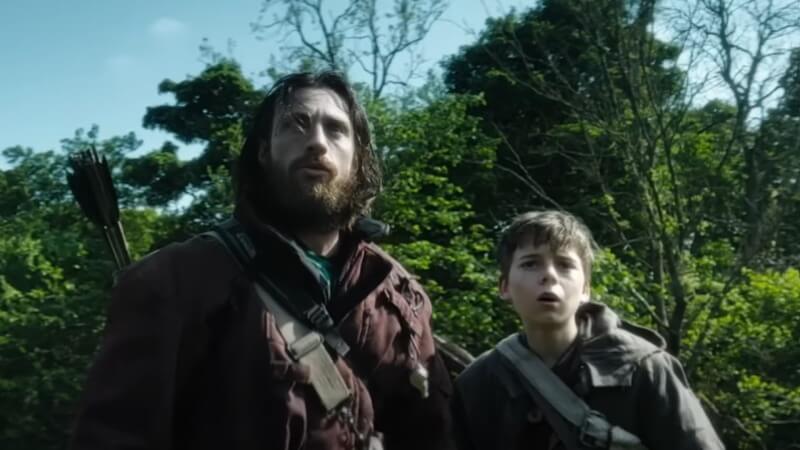The 25 Best Movies On Demand Right Now (October 2025)

The competition for on-demand movies has grown in recent years beyond cable companies like Time-Warner, Charter, Cox Fios and Xfinity to online video-on-demand companies like FandangoNow and internet giants Amazon, Apple and Google. We searched through the offerings of all of the above to bring you the Best Movies On Demand, though no one service offers them all. We limited it to new VOD movies available to rent for less than $10.
Many of the cable companies have branded their Movies on Demand service, so Time-Warner and Charter customers will be looking for Spectrum, Comcast on-demand is branded Xfinity, Verizon goes by Fios and AT&T calls its program U-verse. The selections are up to date, but cable providers change their film on demand offerings regularly.
You can also check out our guides to the best movies on Netflix, Amazon Prime, Max, Hulu, and YouTube. Or visit all our Paste Movie Guides.
Here are the 25 Best Movies on Demand:
1. 28 Years Later
Year: 2025
Director: Danny Boyle
Stars: Jodie Comer, Aaron Taylor-Johnson, Jack O’Connell, Alfie Williams, Ralph Fiennes
Rating: R
Those who were led to a variety of zombie-slaying, post-apocalyptic hellscapes by the original 28 Days Later may be taken aback by how much of Boyle’s film, reuniting him with the original’s screenwriter Alex Garland, takes a more coming-of-age shape. After a harrowing opening flashback that provides another glimpse into the initial virus outbreak, the movie jumps forward, again using its title as an on-screen time marker. Around 2030, a pocket of seemingly thriving society has formed on an island off the English coast, accessible by a single narrow causeway at low tide and fortified with far-seeing guard posts. 13-year-old Spike (Alfie Williams) is about to undergo the island’s coming-of-age ritual: Accompanied by his father Jamie (Aaron Taylor-Johnson), he will travel to the mainland for the first time and put his long-practiced zombie-killing skills to use.
Spike seems less worried about the rage-virus hordes than his otherwise-afflicted mother Isla (Jodie Comer), bedridden and prone to memory loss and disorientation. He becomes increasingly determined to help her, as a rift grows between his loving yet sometimes intractable father. To offer more in the way of plot details might spoil the movie’s strange, beguiling combination of tripwire-tight suspense and episodic wandering. Suffice to say that some of the most obvious candidates for set pieces do not come to pass, and that the film occasionally resembles an eerie fairy tale. —Jesse Hassenger
2. Sinners
Year: 2025
Director: Ryan Coogler
Stars: Michael B. Jordan, Hailee Steinfeld, Miles Caton, Jack O’Connell, Wunmi Mosaku, Jayme Lawson, Omar Miller, Delroy Lindo
Rating: R
Give it to writer/director Ryan Coogler (Fruitvale Station, Black Panther) for coming at Sinners, his first horror feature, with the intentionality of a PhD student with something to prove. There’s no shortage of existing lazy or derivative vampire movies that he could have easily bested with modest effort. Instead, Coogler cracked the history books, collected his A-list family of collaborators, including composer Ludwig Göransson, production designer Hannah Beachler, director of photography Autumn Durald Arkapaw, costume designer Ruth E. Carter and ever-trusted leading man Michael B. Jordan, to cinematically (with a capital C) transport the audience to a 1930’s Jim Crow Mississippi ripe for all kinds of delicious trouble.
Coogler’s Sinners screenplay is original but it most certainly carries the baton for what Misha Green explored in her mashup of horror, the supernatural and Black oppression in her HBO series, Lovecraft Country (2020). Although that series was ultimately too broad with its ambitions, Coogler wisely stays hyper-focused on just two monsters – the vampire and bigoted Whites who wear hoods. Coogler weaves vampiric metaphors into the societal oppression of the Old South and asks the audience to consider, which is worse? —Tara Bennett
3. On Becoming a Guinea Fowl
Year: 2025
Director: Rungano Nyoni
Stars: Susan Chardy, Elizabeth Chisela, Henry B.J. Phiri
Rating: PG-13
Post-viewing, the title of Rungano Nyoni’s sophomore movie, On Becoming a Guinea Fowl, reads as encouragement as well as instruction: You should follow the bird’s example, and here’s how. “Becoming” is not to be taken literally. Nyoni works in her own sandbox and not the one constructed by Franz Kafka in 1915; her film orbits around the guinea fowl as an inspiring figure, one alluded to more so than present in the frame but whose function on the savannah resonates within the story’s patriarchal systems and insular traditions. If only generations past had a guinea fowl in their midsts to signal the flock of imminent abuses.
On Becoming a Guinea Fowl begins slowly, relaxedly, as Shula (Susan Chardy) casually motors down a backroad under the blanket of night; she’s returning home from a party, gotten up in the iconic trash bag-cum-bedazzled helmet ensemble Missy Elliott rocked in 1997’s “Supa Dupa Fly” music video. With a casual glance out her window, Shula sees her uncle, Freddy, unexpectedly lying prone in the opposite lane.
Shula’s unfussed reaction to Freddy’s demise is motivated by grim, unsavory secrets that rest in her extended family’s soul, corrupting all, from the people doggedly protecting it out of misplaced devotion to the dead, and to custom, to the people who likewise handle the news without so much as a shrug of the shoulder. Nyongi makes the truth explicit as On Becoming a Guinea Fowl’s plot unfolds, and laces the build-up to truth’s revelation with hints at what’s eating Shula, Nsansa, and their cousin Bupe (Esther Singini). —Andy Crump
4. Eddington
Year: 2025
Director: Ari Aster
Stars: Joaquin Phoenix, Pedro Pascal, Luke Grimes, Deirdre O’Connell, Micheal Ward, Austin Butler, Emma Stone
Rating: R
Ari Aster’s latest film, Eddington, is a divisive film about a divided Nation. Excoriating and exhilarating in equal measure, it is the first truly great movie to deal explicitly with the unique madness and malice that the global pandemic revealed, a kind of touchstone for a time and place that with only a few years remove feels at once as fictional and otherworldly as a sci-fi novel, and at the same time the very real-world harbinger of the political shifts that proceeded.
Eddington provides another genre mélange, locking onto elements that equally fascinate the likes of the Coen brothers who, admittedly, tend to use a scalpel rather than Aster’s chainsaw to make their equally acidic takes. The Coens are masters of the blackly comedic travails of hapless individuals lost in mayhem of their own making, and tonally it’s this element that is built upon, with Aster approaching things in an even more vitriolic way, managing to burst the syphilitic sores of American society. The writer/director prods at performative liberalism and conservative epistemological fallacies alike, as well as setting his gaze upon cultish delusions, the pornographic obsession with firearms treating a single constitutional amendment like a biblical testament, the simmering violence of political power, and even the territorial complexities between settler and the colonized that defines the American experiment. —Jason Gorber
5. Jurassic World Rebirth
Year: 2025
Director: Gareth Edwards
Stars: Scarlett Johansson, Mahershala Ali, Jonathan Bailey, Rupert Friend, Manuel Garcia-Rulfo, Ed Skrein
Rating: PG-13
At first, it still seems very familiar; Jurassic World Rebirth is basically Jurassic Park III on steroids, inching the world back toward status quo after previous entries unleashed dinosaurs on the entire planet. Now they’ve retreated mostly to quarantined equatorial areas, with humans forbidden from entering these barely-policed zones. That’s where Zora Bennett (Scarlett Johansson) is hired to go, along with fellow mercenary Duncan Kincaid (Mahershala Ali), paleontologist Dr. Henry Loomis (Jonathan Bailey), and some other team members, alongside pharmaceutical rep Martin Krebs (Rupert Friend), who is paying them all a lot of money for the mission. In a quest that could be described as gamified, they’re traveling to a human-free dino island to extract blood samples from the three biggest dinosaurs around, in hopes of synthesizing a revolutionary anti-heart-disease drug.
That’s largely how Jurassic World Rebirth is allowed to play out and, as it happens, the two leads are quite cute together – the rare Jurassic Park near-coupling that’s cheerfully flirtatious rather than remarriage-coded. (Their lips don’t actually touch, of course, because summer blockbusters have unofficially adopted the Hays Code.) Johansson is essentially playing a smilier, less deadpan version of her Black Widow character from Marvel, and if there isn’t much surprise to her character, she still cuts a fine action-hero figure. —Jesse Hassenger
6. Friendship
Year: 2025
Director: Andrew DeYoung
Stars: Tim Robinson, Kate Mara, Jack Dylan Grazer, Paul Rudd
Rating: R
Is there a male loneliness epidemic, or is it more of a male idiocy epidemic? That’s the question poised by Friendship, a new comedy written and directed by Andrew DeYoung, but that is so in sync with star Tim Robinson’s distinct comedic voice that you’d be excused for assuming he made it himself.
Robinson plays Craig, a boring suburban nebbish whose cancer-recovering wife is obviously depressed (Kate Mara), whose teenage son is clearly counting the days until he can leave (Jack Dylan Grazer), and whose direct reports at his middle management job don’t even try to hide their contempt for him. Craig seems blithely unaware of all of this, making mundane small-talk about the latest Marvel movie while his family basically ignores him, and spending his nights in front of the TV. The kind of excitement he didn’t even know he missed enters Craig’s life when he meets his new neighbor, the local weatherman Austin Carmichael, played by Paul Rudd with the mustache and slightly sleazy charm of his Anchorman character. Austin is the too-cool friend of Craig’s dreams, and after only two hangs Craig fantasizes about the life they’ll have together as best friends. If you’ve ever seen any of Tim Robinson’s work before, you know Craig will screw this whole thing up. And he does, in gloriously uncomfortable fashion, systematically ruining every aspect of his life due to his obsession with Austin and the promise of having a cool, adventurous friend. —Garrett Mitchell
7. The Phoenician Scheme
Year: 2025
Director: Wes Anderson
Stars: Benicio del Toro, Mia Threapleton, Michael Cera, Riz Ahmed, Tom Hanks, Bryan Cranston, Mathieu Amalric, Richard Ayoade, Jeffrey Wright, Scarlett Johansson, Benedict Cumberbatch, Rupert Friend, Hope Davis
Rating: PG-13
It’s safe to say that Anderson’s ornate style of filmmaking isn’t for everyone, with many simply dismissive of the differences film to film and simply writing them all off as silly stuff. This is their loss, of course, and for those even casual fans there’s so much to admire here for the willing. Although this particular story shares some of Asteroid City’s surrealism and The French Dispatch’s immaculate sense of place, the stakes feel somewhat more lighthearted here despite a narrative that involves hand grenades, karate fights, family feuds, flaming crossbow bolts and discussions of the way to best employ slave labor.
The result is a kaleidoscope of kookiness, with scene after scene amping up the stakes to truly existential levels while still feeling like a series of playground hijinks (basketball net included). It’s a film that’s filled with so many wonderful moments that it’s a joy to behold, and even at its darkest it unfolds with a sense of radical frivolity. Del Toro chews the scenery with aplomb, yet it’s relatively newcomer Threapleton whose dour continence and sardonic air is the film’s greatest gift. It’s perhaps unsurprising that the daughter of Kate Winslet manages to shine on the big screen, but it’s here that she’s given a large enough canvas and broad enough set of circumstances to truly captivate. —Jason Gorber
8. Dangerous Animals
Year: 2025
Director: Sean Byrne
Stars: Hassie Harrison, Josh Heuston, Rob Carlton, Ella Newton, Liam Greinke, Jai Courtney
Rating: R
It’s fascinating and enlivening to watch how the fusion of two intensely familiar subgenres–serial killer thriller and shark-starring B-movie–can result in a work that is somehow brimming with life and verve. Like multiplying two negative numbers, the result (in this one instance, don’t get any copycat ideas) becomes positive, rendering buzzy Cannes survival horror flick Dangerous Animals as one of the summer’s most thrillingly visceral surprises. Anchored by a duet of extremely strong genre performances from final girl Hassie Harrison and especially the raw physicality of antagonist Jai Courtney–in a genuinely star-making turn–Dangerous Animals ascends to the top of this particular food chain, a glorified B-movie given appeal beyond its salacious premise through sharp filmmaking and even the occasionally lyrical aside. This is all so much better than “serial killer shark movie” has any right to be.
Nor is the film really any more than it promises: It eschews the need for narrative twists and relies on the elemental simplicity of its metaphor. Hunter vs. hunted. Fisherman vs. fish. Ideological mania vs. the pure determination to survive. We may lump it into the category of “shark movies,” which we’ve previously described as the lowliest of all horror subgenres, but in truth this is less genuinely an entry in that niche than something like 2016’s The Shallows, which represents the gold standard for modern shark films, perhaps the best in the half century since Spielberg’s Jaws launched the era of the summer blockbuster. Dangerous Animals is less purely “shark movie” and instead a tautly made serial killer psychological thriller, which just so happens to thematically weave itself around the grim outline of the ocean’s top predators. In truth, it revolves entirely around the considerably more viciously predatory nature of (male) human beings, as highlighted by a scintillating turn from its villain. —Jim Vorel
9. Oh, Hi!
Year: 2025
Director: Sophie Brooks
Stars: Molly Gordon, Logan Lerman, Geraldine Viswanathan, John Reynolds
Rating: R
Oh, Hi! is not a horror movie, but after establishing Iris and Isaac as a likably imperfect and attractive pair – she’s maybe a little neurotic, he’s maybe a little aloof – it does have a stomach-dropping moment that plays like the rom-com version of the Psycho shower. It involves that pesky word “couple,” which Iris drops with sweetly dorky pride and which Isaac, who for all of his slightly blank affect turns out to have a pretty terrible poker face, blanches. This is a strategic mistake, especially because he’s handcuffed to the rental-house bed at the time, having just finished some playfully barely-kinky sex. Iris – who has previously admitted to having a violent impulse with a previous ex, unacted upon – is devastated by his assessment of their apparently not-quite-relationship, and leaves him locked up for spite. At least, at first it’s for spite. After a sleepless period of fretting and internet rabbit-holing, she decides it’s for some kind of therapy, and though she claims to no longer be furious, she also refuses to let him go just yet.
Actually maybe it’s unfair to say that Oh, Hi! is not a horror movie; anyone who identifies with either Iris or Isaac may receive it as such – and, moreover, the movie is most exciting when it feels like it might pivot into Misery territory at any moment. —Jesse Hassenger
10. Superman
Year: 2025
Director: James Gunn
Stars: David Corenswet, Rachel Brosnahan, Nicholas Hoult, Edi Gathegi, Anthony Carrigan, Nathan Fillion, Isabela Merced
Rating: PG
James Gunn’s Superman is adequate but unnecessary. It is the first major motion picture for his DC universe scheme with WBD. It comes after the superhero wave seems to have crested, the comet flown through the sky, but that comet has a long, wispy tail. Superhero movies have gradually transitioned away from origin stories in their first outings, dropping fans right into action. Studios and creatives are apparently wary that audiences are weary, especially when the origins of heroes like Batman and Superman are already deeply entrenched in the zeitgeist. It’s a kid’s movie with some adult moments and lots of nerdy references, along with new interpretations of familiar characters, just as you would expect.
Though Gunn’s Superman is overburdened by the metaphorical jingling keys of cameos and Easter eggs as well as actual financial expectations, it does feel like someone thought about the story they were telling and how they would like to see it executed rather than just checking a box for four-quadrant appeal. It is a serviceable crowd-pleaser. If only the bar were a little higher, we could be more impressed with Superman leaping over it in a single bound. —Kevin Fox Jr.
11. Black Bag
Year: 2025
Director: Steven Soderbergh
Stars: Cate Blanchett, Michael Fassbender, Marisa Abela, Tom Burke, Naomie Harris, Regé-Jean Page, Pierce Brosnan
Rating: R
Black Bag provides an opportunity to reflect on how far Soderbergh has come since the stagy confrontations of Sex, Lies, and Videotape. Black Bag strives less openly for provocation, but it’s arguably a sexier, and certainly a sleeker, piece of work. Trusting, as usual, no one but himself to serve as cinematographer, Soderbergh amplifies and blows out every visible interior light source, for images that maintain that little bit of distortion at their edges, even when he’s capturing the well-appointed warmth of George and Kathryn’s home (which still skews sickly yellow, in one of his later-period visual signatures).
Coming off the formal experiment of Presence, as well as the formal experiment of, well, most of his filmography, Soderbergh has inspired some grumbling about when he’ll get back to “real” movies, presumably a bigger-budget studio flex akin to his Ocean’s 11 or Traffic. Black Bag, a Fassbender/Blanchett spy picture from Universal subsidiary Focus Features, would seem to fit the bill; it’s got glamor, humor, and a screenplay from Hollywood mainstay David Koepp (who wrote Presence and Kimi, but also Jurassic Park and Spider-Man). Yet it’s also relatively spare – while the movie is more than dinner scenes, the total cast members number under 20; the running time hovering around 90 minutes – and has the dexterity of a genre workout. The truth is, the experimental Soderbergh and the slick studio Soderbergh have long since merged, and Black Bag, a fusion of marriage and espionage that could have come out 80 years out with a few tweaks for content, is the perfect example. The experiments are the real thing. —Jesse Hassenger
12. One of Them Days
Year: 2025
Director: Lawrence Lamont
Stars: Keke Palmer, SZA, Katt Williams
Rating: R
Keke Palmer presumably hasn’t often been strapped for cash since her child-star days – she’s only 31, but has been in show business for 20 years at this point – but it’s just as likely that she understand the hustle that Dreux, her cash-poor character in One of Them Days, goes through on a daily basis. Granted, there’s a lot more struggle to Dreux working long shifts waitressing at a 24-hour chain diner just to afford an apartment in a run-down Los Angeles complex, under constant threat of eviction by her enterprising landlord (who keeps an eye on the gentrification potential of prospective tenants). Still, although Palmer can afford Los Angeles digs, she’s no stranger to the grind. Consider that she’s been so busy hosting stuff, doing guest appearances, doing TV voiceover work, and apparently releasing an album (as well as having a child) that she’s just now getting around to starring in her feature follow-up to Nope, the Jordan Peele movie that seemed poised to break her through to another level of movie acting – two and a half years ago.
One of Them Days, a bright and antic broad comedy, doesn’t carry the same weight as Nope, but it’s also less ephemeral than, say, hosting a redo of Password or showing up for various Jennifer Lopez vanity videos. Unlike those projects, it’s easy enough to imagine this one becoming a beloved and rewatched comfort movie. It follows the reliable one-crazy-day structure, where a couple of straightforward tasks – in this case, pay rent and show up for a job interview – spiral into a digression-heavy schemes and mishaps. The main problem is that Dreux’s roommate and best friend Alyssa (the singer SZA) has delegated the first task to her worthless boyfriend Keshawn (Joshua David Neal), who promptly absconds with the $1,500 owed to their landlord. Now the girls have nine hours to come up with the money, during which Dreux must also nail her interview for a major promotion, hopefully in aid of not running into the same damn problems (however redressed in different clothes) the next month. —Jesse Hassenger
13. Mickey 17
Year: 2025
Director: Bong Joon-ho
Stars: Robert Pattinson, Naomi Ackie, Steven Yeun, Toni Collette, Mark Ruffalo
Rating: R
If the first half of Mickey 17 serves as a pseudo-metaphysical exploration on the value of human life, then the second half is a skillfully edited, purely fun Hollywood sci-fi spectacle, with Joon-ho flexing his strong sense of craft for the entire runtime. When clone Mickey 17 is assumed dead, the scientists print out Mickey 18, without knowing that Mickey 17 has been saved by a population of large, toothy bug mammoths, creating an illegal double. 18’s cocky, rebellious personality has sprouted from a repressed place inside of 17. Much of the comedy is derived from the two Pattinson roles clashing with each other, as well as Joon-ho’s deft ability to both frame a shot and time his cuts for maximum comedic effect. There are shades of Riley Stearns’ 2022 film Dual, which also pitted Karen Gillan against her own clone.
Mickey’s function as a protagonist is less to dismantle the political system of Niflheim and more to take the audience on a journey of personal growth with spectacular sci-fi trappings. The declawed, goofy social commentary and traditionally clean Hollywood ending will no doubt disappoint those who are expecting Joon-ho to declare a take down of the system, within both the context of the film and the studio system that produced it. Mickey 17 is in no way a revolutionary follow up to something like 2019’s Parasite, but it’s an entertaining, well crafted ride. —Katarina Docalovich
14. Companion
Year: 2025
Director: Drew Hancock
Stars: Sophie Thatcher, Jack Quaid, Lukas Gage, Megan Suri, Harvey Guillén, Rupert Friend
Rating: R
Truth be told, the first 20-odd minutes of Companion are a bit of a tough sell; the performances are stiff, and the stilted interplay between its characters feels assembled from various abandoned CW show bibles. The overall phoniness of it all set my teeth on edge. Fortunately, it’s here that Companion makes its first twist, recontextualizing all the odd and strangely mechanical things everyone previously said or did. Like Barbarian, the film shifts to a different gear, and so does its cast, smoothing out the movie even as Iris’s situation spirals out of control.
As a romantic sci-fi thriller that often feels like a schmoopy response to Black Mirror, its future-as-parable conceit is imperfect. Society, as it exists in this movie, is ill-defined, and Josh’s technology-embracing nice-guy schtick has little nuance. (I mean, “treating women as malleable fawns makes you an asshole” is hardly the most subversive idea to be tossed into a relationship movie, though I did appreciate the sinister edge Quaid applies to his million-buck grin.) By comparison, Iris is the more compassionate, multifaceted character (Thatcher successfully wriggles free of her character’s Stepfordian trappings early on), which, perhaps rightfully, simplifies the film’s conflict. Hancock lets us have fun with the candy-coated easiness of it all. Once Iris breaks free from Josh’s control, Companion becomes a gleefully silly, crowd-pleasing techno-romp, a Turing test valentine for those still learning to better love themselves. —Jarrod Jones
15. The Monkey
Year: 2025
Director: Osgood Perkins
Stars: Theo James, Tatiana Maslany, Christian Convery, Colin O’Brien, Rohan Campbell, Sarah Levy, Adam Scott, Elijah Wood
Rating: R
The Monkey doesn’t exactly conceal that the monkey toy, by “choosing” people in relatively close proximity but without any further detectable rhyme or reason, is standing in for the cruel randomness of death, the fact that a freak demise could be waiting for us around any corner. But as the movie digs into Hal and Bill’s differing forms of anxiety over that inevitability, The Monkey steers away from the realm of pure horror-comedy japery or specific Stephen King piss-take, and becomes in its haunted way, an affecting coda to the dark joke of life’s potential meaninglessness. Perkins, the son of actor Anthony Perkins, lost both his parents decades ago (his mother was killed in one of the flights on 9/11) and although he has too much experience as a horror showman to deny the audience a gruesome blood circus, he allows an ache to emerge from the spectacle, even from performances that initially seem a little too heightened to work as fully human characters. The canary in the coal mine is Maslany, who lays enough groundwork in her early scenes for the movie to eventually circle back to something more reflective.
That the movie does so without really letting up on its initially contraption-like cheap thrills and self-satisfied transgressions is almost more satisfying than if The Monkey had felt more like a “real” movie to begin with. It’s a little too blunt to call it a magic trick – and a ultimately too reflective about the psychology of grief to call it a blunt-force attack. What sometimes resembles a goof on Stephen King becomes a form of tribute to the author’s ability to mine terror from the mere facts of living. —Jesse Hassenger
16. The Rule of Jenny Pen
Year: 2025
Director: James Ashcroft
Stars: Geoffrey Rush, John Lithgow, George Henare
Rating: R
There’s a razor thin line that exists between the privilege, respect and prestige of an autonomous existence, and the degradation and powerlessness of the existence that comes afterward. No one is as far away from the latter as they imagine themselves to be–one economic downturn, accident or illness, and the whole, carefully constructed safety cushion can (and will) unravel in an instant. This is doubly true, of course, for those of advanced age, or those without family who are bound by the rules of polite society to directly care for them. And it’s at that moment, when we’re at our lowest and most vulnerable, that a predator is likely to make its taunting presence felt. That’s what director James Ashcroft’s psychological horror film The Rule of Jenny Pen is all about: The dethroning of a petty tyrant using a blind spot in the system to inflict misery. It may not exactly be deep, or dependent upon layers of metaphor to divine its meaning. The new feature, debuting on Shudder today, delivers no more and no less than what it promises: A deeply creepy, ultimately engrossing battle of wills between two phenomenal lead performers.
17. Love Lies Bleeding
Year: 2024
Director: Rose Glass
Stars: Kristen Stewart, Katy O’Brian, Jena Malone, Anna Baryshnikov, Dave Franco, Ed Harris
Rating: R
Love Lies Bleeding is, in actuality, a far more effective horror film than Saint Maud. Filmmaker Rose Glass excels at crafting horrific images, moments of pure grotesquery and terror, and she pushes the boundaries of an otherwise grounded thriller-crime drama into something that resembles a gorgeous night terror. Sensuality oozes from every frame for a film that isn’t even terribly gratuitous during its sex scenes. But the physical act of sex between bodybuilder Jackie (Katy O’Brian) and gym manager Lou (Kristen Stewart) equals otherwise non-sexual scenes, such as Lou jabbing a syringe into Jackie’s butt cheek, or Lou Sr. (Ed Harris) whispering in Jackie’s ear before she fires a gun—or even Jackie’s roid rage-fueled murder of JJ (Dave Franco), which plunges Jackie and Lou’s passionate neophyte romance into an explicitly gay Thelma and Louise, where the two lovers must flee the wrath of Lou’s criminal family. The connection between the two women is desperate, carnal and overwhelming, if simultaneously toxic and even a little superficial. Suddenly, nothing matters to Lou quite as much as her ripped new girlfriend, whom she’s more than happy to continue supplying with body-enhancing drugs that cause Monstar-like eruptions under her skin in sequences of heightened surrealism. As the walls close in on Jackie and Lou, Glass amps up the tension with tight, suffocating shots, propulsive editing and an absorbing score by Clint Mansell. At the center of it all is Jackie and Lou’s cacophonous romance. By all accounts, the gay Romeo and Juliet were doomed from the start. Stewart and O’Brian have incredible chemistry, and Stewart’s understated naturalism really shines. Love Lies Bleeding is easily one of the best of 2024 so far: A thorny, thrilling narrative about two fucked-up women that is—most importantly—genuinely, scintillatingly hot. The film is also very obviously about the myriad, terrifying ways human beings express love to one another, and on the surface seems to question which ones are more or less valid.–Brianna Zigler
18. The New Boy
Year: 2025
Director: Warwick Thornton
Stars: Aswan Reid, Deborah Mailman, Wayne Blair, Cate Blanchett
Rating: NR
Is it possible to earnestly share one’s faith to someone who has no choice but to listen? If I’m determined to share my religious views with you, it will of course be within your scope of options to simply disregard or disengage. But what about when the target of that proselytization is a small child; one plucked from their own self-contained existence and physically brought under duress to a remote Australian Catholic monastery for orphaned boys? Is it even possible to, in these circumstances, “share” religious learning with this kid, without it being tantamount to an ultimately violent assault on the culture he inherited at birth, the culture now being taken from him? And if he begins to accept some of those inescapable teachings in the interest of embracing the only community available to him … has he in some way betrayed that heritage? These are some of the heady musings at the heart of director Warwick Thornton’s The New Boy, an Aussie religious drama that premiered at Cannes in 2023, finally headed to the U.S. this week in limited theatrical release. Gorgeously shot and intellectually/emotionally provoking, the film tantalizes with transcendent revelations but is simultaneously unbalanced in how it approaches its characters and minimalist storytelling.
Likewise written by Thornton, The New Boy’s sparse outline feels like it could have been a premise poached from the little black books of Stephen King or Guillermo del Toro. A nameless, mysterious Aboriginal boy (Aswan Reid, captivating throughout)–sporting an unusual shock of blonde hair that suggests almost mystical origins–is discovered by British soldiery wandering the desert and violently captured (yes, a boomerang is employed). Treated like a piece of luggage, he’s dumped at the rural monastery run by Sister Eileen (Cate Blanchett), where orphaned boys (and some other Aboriginal children) are given Christian upbringings, taught to speak and write English, and made fit to enter white society. But ah, “the new boy” is a cinematic Special Child, speaking not a word of any intelligible language, but seemingly gifted with a suite of mysterious, supernatural abilities that are as natural to him as breathing. You expect this might result in something like a battle of wills, as Sister Eileen and The New Boy attempt to assert their beliefs and integrate the fantastical abilities of the child into a worldview reflecting their faith. Instead, however, it’s compassion that motivates their interactions, but this has a beguiling, almost seductive effect of its own. Will the good-natured child’s abilities threaten Sister Eileen’s convictions? Or will her kindness and hospitality threaten the boy’s spiritualism, stripping him of his unique gifts the same way the Catholic system tries to remove the “savage” nature of its dark-skinned Aboriginal charges? —Jim Vorel
19. Sorry, Baby
Year: 2025
Director: Eva Victor
Stars: Eva Victor, Naomi Ackie, Louis Cancelmi, Kelly McCormack, Hettienne Park, E. R. Fightmaster, Lucas Hedges, John Carroll Lynch
Rating: R
There’s nothing funny in Agnes’ debilitated mental health. But if life goes on after the bad thing, then it stands to reason that so too does humor, whether that’s manifested in the banter Victor and Ackie so pleasurably engage in together, or quippy small-talk between Agnes and Pete (John Carroll Lynch) in a sandwich shop parking lot painted in seagull effluvia.
That’s the film’s sweet spot: the space between comedy and melancholy, the kind with ineluctable gravitational weight, pulling down the people unfortunate enough to know it and forcing their lives into holding patterns. Sorry, Baby meshes both sensations together so cleanly that they become one and the same, impossible to disentangle–a rare balancing act between respecting survivor stories and humanizing them. Victor reflects lived experiences through their filmmaking, genuine and whole, the bad existing smack dab next to the good, where the former’s impact hits with grim clarity while the latter sparks with livewire personality. As sobering as the film gets, it remains, as a work of art and expression of Victor’s thoughtful voice, a real joy. —Andy Crump
20. Bring Her Back
Year: 2025
Directors: Danny Philippou, Michael Philippou
Stars: Billy Barratt, Sora Wong, Jonah Wren Phillips, Sally Hawkins
Rating: R
In stark contrast to the (relatively) welcoming multiplex horror of Talk to Me, Danny and Michael Philippou’s sophomore horror feature Bring Her Back makes clear its intention to drag the viewer screaming down into the mouth of hell through sheer, agonizing uncomfortability. This is an absolute endurance run of a watch, a harrowing but equally emotional story laden with that ubiquitous prestige horror tandem of Grief and Trauma, but set apart by just how nasty it commits to being in its delivery of both physical violence (toward children, no less) and psychic misanthropy. On the surface, Bring Her Back is almost a classical fable: Two children, one on the cusp of adulthood, adopted after their father’s passing by a woman who turns out to be something akin to wicked stepmother. But the Australian twin filmmakers add layers of painful complexity to each character’s relationship with each other and with the truth of their circumstances, turning Bring Her Back into an intense psychological minefield, particularly for the mostly blind Piper (Sora Wong), a long-suffering girl who must wade through the perpetual lies she is fed (to both “protect” and deceive) on account of her lack of sight. Stand-out performances from an unhinged Sally Hawkins and especially from deeply disturbing, demonically possessed Aussie child actor Jonah Wren Phillips make Bring Her Back extremely difficult to banish from thought after witnessing it. Even through closed eyes, the audio alone will haunt you. —Jim Vorel
21. Novocaine
Year: 2025
Directors: Dan Berk, Robert Olsen
Stars: Jack Quaid, Amber Midthunder, Ray Nicholson, Betty Gabriel, Matt Walsh, Jacob Batalon
Rating: R
Novocaine starts with a premise that is Crank-like in its absurdity, deepens it with feeling, and then rams full speed ahead through a litany of stupidities. A common message-board-level complaint about a movie is that it “doesn’t know what it wants to be.” Here’s a helpful correction: Most movies, even bad ones, know. What Novocaine seems less sure of is why it wants to be. To sell a high-concept screenplay, probably. You can see why someone would buy it. Nathan Cain (Jack Quaid) has a rare genetic condition that doesn’t allow his body to feel any pain, nor sensations of heat, nor cold. This leaves him both resilient and fragile. A fist, knife, or bullet might not faze him, but could still kill him; our bodies have pain receptors for a reason, and Nathan’s body is incapable of receiving crucial warning signs. Once given an approximate life expectancy of 25, he has surpassed it through learned vigilance: He only consumes drinkable foods, because he has been warned that he could accidentally bite off his own tongue, and he must set a three-hour timer reminding him to use the bathroom, lest he strain his bladder without realizing it. —Jesse Hassenger
22. Red Rooms
Year: 2024
Director: Pascal Plante
Stars: Juliette Gariépy, Laurie Babin, Elisabeth Locas, Maxwell McCabe-Lokos, Natalie Tannous, Pierre Shagnon, Guy Thauvette
Rating: NR
Red Rooms is a movie fixated on a single performance, itself fixated on a serial killer. The performance is that of Juliette Gariépy, fantastic as the unblinking Kelly-Anne. The serial killer is the Gollum-like and dead-eyed Ludovic Chevalier (Maxwell McCabe-Lokos), accused of butchering three young girls live on a pay-per-view stream. This dark web snuff stream is a Red Room, and it’s unclear what aspect of the case Kelly-Anne is obsessed with as she stares intently in the background of the film’s gripping courtroom scenes.
Is she another romanticizing rubbernecker here to ogle real deaths as true-crime entertainment? Or is it darker? Is she—like her trial-observing counterpart Clémentine (Laurie Babin, excelling at a more emotive, girlish foil)—a hybristophilic fangirl, a prison groupie who’d send a love letter to Ted Bundy? These questions, and the complexity that lies underneath, drive Red Rooms beyond the effectively daunting way writer/director Pascal Plante reveals the details of the central crimes. And, without ever showing too much, Plante has crafted one hell of a stomachache. He doesn’t show, and he barely tells. The little we do glean only adds to the dreadful realism. Less than two hours, yet feeling like an eternity thanks to some well-planned and executed long takes (featuring some particularly engaging monologues from Natalie Tannous, playing the prosecutor), Red Rooms traps us in the mindset of its intense lead as we get ever more involved with the case. —Jacob Oller
23. Universal Language
Year: 2025
Director: Matthew Rankin
Stars: Rojina Esmaeili, Saba Vahedyousefi, Sobhan Javadi, Pirouz Nemati, Mani Soleymanlou, Danielle Fichaud
Rating: NR
Rankin has crafted something that really is rather remarkable–a deeply weird, delightfully strange, inspiringly imaginative and genuinely heartfelt ode to how identity is shaped by community, connectedness and the uncontrollable randomness of fate. A wholly original fusion of Iranian cinema and esoteric gags about the banality of life in Winnipeg, it’s a totally original conceit from start to finish, and simultaneously one of the most unexpectedly funny and poignant films I’ve seen in recent memory.
The spell Rankin is able to cast begins with the surreal setting that Universal Language evokes, that of an alternative Canada that is one part Tehran, and one part dystopian, Soviet-evoking, monolithic brutalist architecture in seemingly infinite shades of beige. Most people speak Persian; some multi-linguates have also acquired French. Tim Hortons still exists in this world, but here it’s in the form of a homey, softly lit Turkish coffee parlor where matrons prepare donuts and steaming samovar full of tea–Iran’s national drink. As a tour guide leads a group of Winnipeg gawkers past such sights as a famously discarded mystery suitcase that has never been opened, they pass billboards with uplifting slogans such as the following: “A strong economy helps to prevent feelings of worthlessness.” —Jim Vorel
24. Familiar Touch
Year: 2025
Director: Sarah Friedland
Stars: Kathleen Chalfant, Carolyn Michelle Smith, Andy McQueen, H. Jon Benjamin
Rating: NR
Ache informs much of Sarah Friedland’s Familiar Touch, a still, gentle film about the ravages of time told with uncommon grace and dignity. Ache, for a life that’s gone by, and respect, not just for those whose time is nearing its end but also for those who strive to make these last years dignified and peaceful. It is a film attuned to decline, not just to the pain it can cause, but to how it refracts memory, presence, and touch. Above all else, it’s a film acutely aware of memory’s place in a person’s sense of identity, how it can unfairly slip through hands desperate to hold on.
Kathleen Chalfant plays Ruth, a woman whose presence of mind is slipping; in fact, her sense of place and time seems to shift with the breeze. The film begins with a gentleman caller arriving at her sunlit home to share a pleasant lunch. An outing is planned, but she forbids him to reveal where. He obliges—because a gentleman, as she reminds him, never spoils a surprise. This exchange, unhurried and oddly distant, evolves into a duet of mistaken identity and delicate misremembrance. The man tells her he’s an architect. She, smiling, says her father is a carpenter and that the man should meet him someday. “I’d like that,” he says guardedly but warmly. Her hand lingers on his leg flirtatiously. Lunch comes to an abrupt end. Recollection hits: she’s married. Then comes the present crashing in with harsh clarity: she knows where they’re going and, embarrassingly, who this man is. Not a suitor, but her son, Steve (an emotionally tousled H. Jon Benjamin). A confrontation at this moment in Familiar Touch would have been painful, taxing, and expected. Instead, what follows is Ruth’s abrupt transition from home to here, bringing its own hurt without resorting to emotional manipulation. —Jarrod Jones
25. Borderline
Year: 2025
Director: Jimmy Warden
Stars: Samara Weaving, Ray Nicholson, Jimmie Fails, Alba Baptista, Eric Dane
Rating: R
First things first: Borderline is not the film it is sold as/implied to be by its poster and trailers. The feature film directorial debut of Cocaine Bear scribe Jimmy Warden looks like a “woman fights back against the world” thriller, one framed from a darkly comedic angle as a 1990s pop star heroine is accosted by an obsessed, delusional fan and his followers, and must earn her freedom through that timeworn process of cinematic purgatory: Suffer, fight, rise above. All of the marketing for Borderline zeroes in on the elemental simplicity of that premise: A woman, and her battle for freedom and survival.
In truth, that’s not what the film actually is. Borderline is an oddball genre mishmash, one where it can be difficult at times to read the writer-director’s intention–are we supposed to be laughing, or cinging? But Warden’s film, for some of its scriptural stumbles and wonky choices, is also rather bold in its construction, subverting the expectation of how you would expect this sort of story to be framed, and stylishly infused with both musical gusto and a good number of gags that find their mark. It’s a weirdly ambitious mixed bag, held aloft by several strong supporting performances and a director oddly interested in fleshing out his full ensemble rather than hewing to a tight central story. It all gives the film an almost experimental air one would not expect to see as part of its DNA. —Jim Vorel







































